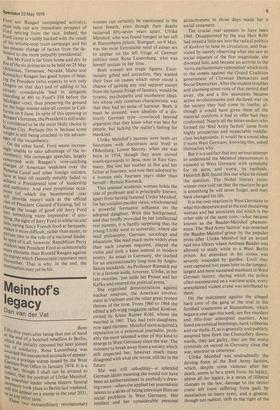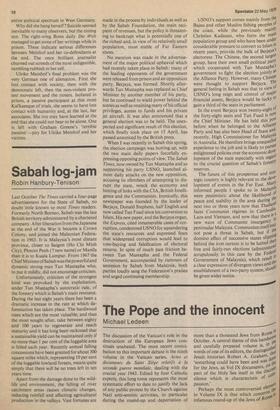,Meinhof's
Ihegacy uan van der Vat
Bonn
.t irifftLY-five Years after being shot out of hand N-1,''e end of a botched rebellion in Berlin, Which she of opposed but later joined aLtt of solidarity, Rosa Luxemburg was i warded the unexpected accolade of appearGerman Postage a Postage stamp issued by the West saf-,:inkall Post Office in January 1974. It is a uet, though 1 shall not be around to th—lect, that the portrait of Ulrike Meinhof, ceer anarchist leader whose bizarre funeral will n'l°n took place in Berlin last weekend, Or at PPear on a stamp in the year 2031, These any other time: hese two extraordinary revolutionary
women can certainly be mentioned in the same breath, even though their deaths occurred fifty-seven years apart. Ulrike Meinhof, who was found hanged in her cell at Stammheim prison, Stuttgart, on 9 May, was the most formidable rebel of either sex to appear on the left fringe of German politics since Rosa Luxemburg, who was herself unique in her time.
Both women are tragic figures. Enormously gifted and attractive, they wasted their lives on causes which never stood a chance of gaining any real support except from the lunatic fringe of fanatics, would-be tyrants, psychopaths and incoherent idealists whose only common characteristic was that they had no sense of humour. Both, it must be stressed, were idealists of a distinctly German type—convinced beyond argument that they knew what was best for people, but lacking the realist's feeling for mankind.
Ulrike Meinhof's parents were both art historians with doctorates and lived in Oldenburg, Lower Saxony, when she was born in 1934, though they soon moved south-eastwards to Jena, now in East Germany. She lost her mother at five and her father at fourteen, and was then adopted by a woman only fourteen years older than herself—Renate Riemeck.
This unusual academic woman holds the title of professor and is principally known, apart from having fostered Ulrike Meinhof, for her socialist-Pacifist views, which exerted a powerful formative influence on the adopted daughter. With this background, and that briefly provided by her intellectual real parents, it is hardly surprising that the young Ulrike went to university, where she read philosophy, German, sociology and education. She read much more widely even than such courses required, played the violin and took a keen interest in modern poetry. As usual in Germany, she studied for an unconscionably long time by AngloSaxon standards. As Professor Rierneck put it in a famous aside, however, Ulrike, in her late twenties, 'put aside her Proust and her Kafka and entered the political arena.'
She organised demonstrations against nuclear weapons, the American involvement in Vietnam and the other great protest themes of the time. From 1960 to 1964 she edited a left-wing magazine called Konkret, owned by Klaus Rainer Rohl, whom she married in 1961. They had twin daughters, now aged thirteen. Meinhof soon acquired a reputation as a polemical journalist, probably the most talented writer of this kind to emerge in West Germany since the war. The moment to break away from a society which still respected her, however much many disagreed with what she wrote, still lay in the'
future.
She was still salonfiihig—a splendid German idiom meaning she would not have been an embarrassment in anybody's drawing room—when she applied her journalistic talents to a series of biting television films on social problems in West Germany. Her intellect and her considerable personal
attractiveness in those days made her a social ornament.
The crucial year appears to have been 1968. Disappointed by the way Herr Rohl had mixed a little sex into the radical politics
of Konkret to raise its circulation, and frus
trated by merely observing what she saw as social injustice of the first magnitude, she divorced him, and became an activist in the 'extra-parliamentary opposition' which took to the streets against the Grand Coalition government of Christian Democrats and Social Democrats. After the student troubles and alarming street riots of that period died away, she and a few associates became active revolutionaries and declared war on the society they had come to loathe, al though it would have given them all the material comforts it had to offer had they conformed. Nearly all the bitter-enders who formed the 'Red Army faction' came from highly prosperous and respectable middleclass backgrounds. It would be a sound idea if more West Germans, knowing this, asked themselves why.
But it is a sad fact that any serious attempt to understand the Meinhof phenomenon is equated in West Germany with sympathy for its aims, and worse, its methods. Heinrich Boll found this out when he raised the question. The Nobel literary prizewinner once told me that the reaction he got is something he will never forget, and may have changed his life.
It is the over-reaction in West Germany to what this desperate and in the end despairing woman and her associates did which is the other side of the same coin—what became known as the Baader-Meinhof phenomenon. The 'Red Army faction' was renamed the Baader-Meinhof group by the popular press after Ulrike Meinhof led an armed raid on a library where Andreas Baader was allowed to study while in a West Berlin prison. An attendant in his sixties was severely wounded by gunfire. Until they were captured two years later in the longest, largest and most sustained manhunt in West German history, during which the police often manoeuvred on a wartime scale, every unexplained violent crime was attributed to them.
On the indictment against the alleged hard core of the gang at the trial in the fortified courtroom at Stammheim, which began a year ago this week, are five murders and fifty-four attempted murders. Also listed are political bombings, bank robberies and car thefts. If, as is generally and publicly assumed here from the Chancellery downwards, they are guilty, they are the worst criminals on record in Germany since the war, terrorist or otherwise.
Ulrike Meinhof was undoubtedly the driving force of the Red Army faction, which, despite some violence after her death, seems to be a spent force. Its legacy, above all her legacy, is a series of illiberal changes in the law, damage to the democratic left (now suffering from guilt by association in many eyes), and a general, though not radical, shift to the right of the
entire political spectrum in West Germany.
Why did she hang herself? Suicide seemed inevitable to many observers, but the timing not. The right-wing Bonn daily Die Welt managed to get some of her writings while in prison. These indicate serious differences between Meinhof and her co-defendants at the end. The once brilliant journalist churned out screeds of the most indigestible, rambling rubbish in her cell.
Ulrike Meinhof's final problem was the very German one of alienation. First she lost contact with society, then with the democratic left, then the non-violent protest movement and the rioters. Isolated in prison, a passive participant at this most Kafkaesque of trials, she seems to have lost contact with humanity and, at the last, her associates. She too may have learned at the end that she could not bear to be alone. One is left with Graham Greene's 'terrible passion'—pity for Ulrike Meinhof and her victims.



































 Previous page
Previous page